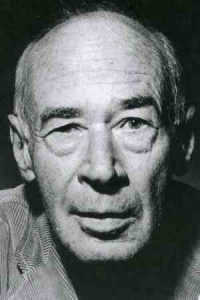
Henry Miller (December 26, 1891 – June 7, 1980) was an American writer. He is known for several 20th century works that reflect his own personal experiences, including Tropic of Cancer (1934), Black Spring (1936) and The Rosy Crucifixion Trilogy (1965). Miller’s explicit and often obscene content led the way for a new generation of American writers. He also wrote travel memoirs and literary criticism, and painted watercolors, He died on June 7, 1980, in Pacific Palisades, California.
The publication of Miller’s Tropic of Cancer in the United States in 1961 by Grove Press led to a series of obscenity trials that tested American laws on pornography. The U.S. Supreme Court, in Grove Press, Inc., v. Gerstein, citing Jacobellis v. Ohio (which was decided the same day in 1964), overruled the state court findings of obscenity and declared the book a work of literature; it was one of the notable events in what has come to be known as the sexual revolution. Elmer Gertz, the lawyer who successfully argued the initial case for the novel’s publication in Illinois, became a lifelong friend of Miller’s; a volume of their correspondence has been published.[59] Following the trial, in 1964–65, other books of Miller’s which had also been banned in the US were published by Grove Press: Black Spring, Tropic of Capricorn, Quiet Days in Clichy, Sexus, Plexus and Nexus.
Following a difficult period in his personal life, including two unsuccessful marriages, Miller traveled to Paris, France, in hopes of fulfilling his dream of being a writer. Although he had little money, he spent the next 10 years (1930-40) writing some of his most well-known early works. He was financially supported at that time by French novelist Anais Nin, with whom Miller allegedly had an affair.
In 1934, Miller composed Tropic of Cancer, a semi-autobiographical account of his experiences in Paris. Its prequel, Tropic of Capricorn, was published in 1939. Due to their explicit sexual passages, both books were banned in the United States for nearly three decades. The publicity, however, helped bring Miller to fame, and the books became best sellers. Other works from this period include the novel Black Spring (1936) and the travelogue The Colossus of Maroussi (1941).
In 1940, Miller returned to America, settling on California’s Pacific Coast. During that time, he offered comedic and often critical views of the United States in The Air-Conditioned Nightmare (1945), Remember to Remember (1947) and Big Sur and the Oranges of Hieronymus Bosch (1958). His trilogy, The Rosy Crucifixion (1965), chronicled the struggles of an American writer trying to find success. Frequently shocking and offending critics, Miller’s freedom of language and his ability to convey an honest truth opened the way for the “Beat Generation.”
